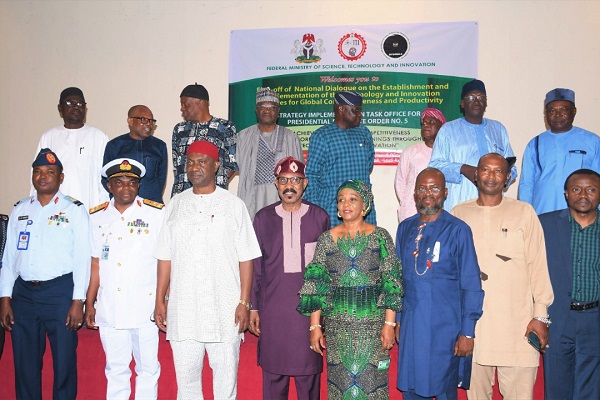
The Federal Government and stakeholders in the science, technology and innovation (STI) have resorted to dialogue to improve and promote Nigeria’s monetary, fiscal and trade policies using STI for global competitiveness and productivity.
The Minister of Science, Technology and Innovation, Sen. Adeleke Mamora made this known, in Abuja, during his remarks at the flag-off of the national dialogue between the government and other stakeholders in the science, technology and innovation (STI) ecosystem, comprising academic and research institutions, organised private sector (OPS), professional bodies and the general public on the establishment and implementation of the technology and innovation centres for global competitiveness and productivity, themed “Achieving Nigeria’s Competitiveness and Improved Foreign Exchange Earnings through Science, Technology and Innovation.
The dialogue will serve as an avenue for the promotion of technology utilization, strengthening of technology management and information systems, the facilitation of commercialization and global competitiveness, as well as strategies for the full implementation of EO-5.
“This,” Mamora explained, “is the first dialogue ever to be held in line with the E0-5. Also, it has become important for STI to play an important role in the fiscal and monetary policies of the country for better today and tomorrow. Over the years, the role of STI in the development agenda of the nation has been relegated. However, the dwindling revenue base and decline in foreign exchange earnings of the country calls for serious concern, hence the need to look inwards at the active impact science, technology and innovation (STI) can play in reversing these trends.
“The global competitiveness index for Nigeria, though low, is currently targeted at making policymakers and other stakeholders work together to achieve short-term growth and focus on long-term prosperity for the country. It is equally important to note that there are declining trends in several areas of productivity which have not resulted in improved economic development. This is why this administration is innovating to have a shift in policies [which indicate] most importantly, STI for economic recovery and growth.
“Let us not forget in a hurry that the economic transformation of the country should give a measure of readiness to move to a greater height to drive productivity, sustainability and shared prosperity, thus achieving this government’s aim. However, the COVID-19 pandemic made a negative impact on businesses and, thereafter, stalled progress.”
The Buhari administration showed and improved the government’s responses to change and collaboration between government and investors, including firms. Also, social safety net protection and a sound financial institutional framework have been tailored toward the economic transformation of the country.
According to Mamora, research and development capacity and capability of the country based on governance and planning, as well as an adequate health system, are being put in place to contribute to resilience in all sectors.
“The outbreak of the pandemic had led to high unemployment rates and poverty, thereby reversing the gains achieved over the past few decades. The pandemic showed the inadequacies of infrastructure and policies, ranging from social protection systems to healthcare. The pandemic and its aftermath have shown that not much has been invested in the requisite innovation that could make our societies more inclusive, sustainable and resilient.
“The innovation ecosystem of the country is geared towards the generation of ideas, their translation into products and the commercialisation of these products on a large scale. The trajectory in business and research and development(R&D) are the main drivers of innovation, including sound policies, thereafter, from good technological progress towards accelerating the goals of sustainability and shared prosperity. This was the reason for the establishment of the Presidential Executive Order No 5.”
In his remark, the Minister of State, Science, Technology and Innovation, Chief Henry Ikoh disclosed that STI is required to create sustainable national wealth for the nation or move the economy from consumption to production.
“Any country that needs to be developed technologically must make drastic efforts and commitments toward developing its indigenous STI base. Without it, there will be no meaningful sustainable development. It is on this backdrop that Mr. President issued Executive Order No. 5 and inaugurated the Monitoring and Evaluation Council (PMEC) for the implementation of the Presidential Executive Order No.5 (EO-5) to assist in taking steps to create quality jobs for the youth and women, improve on value addition to raw materials, reduce poverty and create jobs towards national wealth creation, resulting from global competitiveness of Nigerian goods and services.
“The establishment and implementation of these technological and innovation centres will serve as hubs for the promotion of technology utilisation, strengthening of technology management and information systems, the facilitation of commercialisation and global competitiveness.
“These hubs will bring together government, academia, industry and civil society [and act] as unifying centres for constant dialogue on strategies for the promotion of industry and business-driven research, development and innovation activities which will focus on reverse engineering, innovativeness, production, value addition and commercialisation leading to global competitiveness and ultimately sustainable wealth creation. It will also support the stabilisation of the nation’s foreign exchange.”
The permanent secretary, Ministry of Science, Technology and Innovation, Mrs. Monilola Udoh said that funding has been a recurrent issue in every aspect of our lives.
“We need to be creative and prioritise and expect more in the country.”
The national coordinator and chief executive of Strategy Implementation Task Office for Presidential Executive Order No. 5 (SITOPEO.5), Engr. Ibiam Oguejiofo said to move Nigeria from a consumption to a production economy, resources to knowledge-based economy or to increase the export of goods and services and import less, the nation needs STI.
“For Nigeria to take its rightful place in the comity of nations we need STI,” he added.

